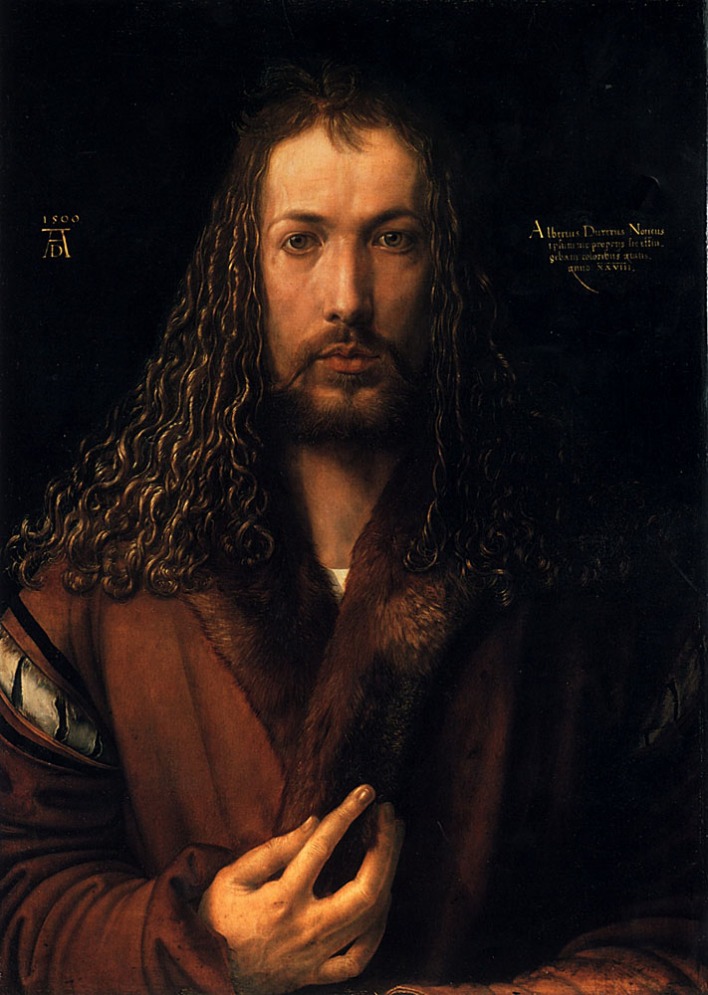 Albrecht Dürer, Self Portrait, 1500
Albrecht Dürer, Self Portrait, 1500
The second poem I heard read here at school was B.H. Fairchild’s Rave On. Someone declaimed it, almost shouting, in a house full of pictures of saints and students who thought that this poet was the closest thing to a hero we had. Rave On was everything we wanted to be, and Beauty too, perhaps more than the first.
There is a B.H. Fairchild night here every semester, somewhere between Eliot and Shakespeare in the line-up of authors. His poems are hard-hitting, occasionally obscene, constructing a bridge between high art and the brutally quotidian. Machine-shop innuendos and carwrecks and dying midwest towns in the same universe as Dürer and Virgil and Bach. They always draw a crowd–students leaning on the window-ledges and couch backs, thumbed paperback copies of The Art of the Lathe and Usher on the floor. And this semester, B.H. Fairchild was visiting the campus in April. B.H. Fairchild, the man, in person! We were elated.
He was as paradoxical as his poems, narcissistic in the way of very intelligent people who know they have led extraordinary lives. He gave a lecture and a reading in cowboy boots and a suit jacket, worker’s hands and lined face. His father was a machinist who didn’t read. He was enthralled by words and a professor of English at a prestigious university. He spoke about wanting to save his students and not being able to, about how poetic language was akin to the coming into Being-in-the-world, the thing itself, the going-on. All that he wished for his poetry, he said, was that it be a small thing done well.
At the off-campus house where he had been idolized for years, he rambled about all the shitty things he and the guys did in highschool, how the rest of them started a band and went to California and made it big (hot chicks and convertables) while he slogged away at his PhD in English. He doesn’t reccommend doing that, by the way–the college part, that is, not the California debauch. Not right away. Not if you are 18 and male and live through poems like Rave On.
He signed the wall of the off-campus house before he left, like the other visiting poets before him but twice as large. We were exuberant.
~~~~~
At the luncheon I told him that I had been to Nürnberg and had seen Dürer’s self portrait and had such a love of it and of his poem about the work, Blood Rain. Dürer as Christ, the artist as divinity–what a crazy, bold statement, a century before Hamlet and opera and the burgeoning of the human self as a worthy subject of art. He said that he thought Dürer must have been the smug, self-satisfied type, to paint something like that. I didn’t agree, and didn’t think his poem did, either.
Blood Rain
Like rust on iron, red algae invading rain.
And again, the plague. Nuremberg in ruin.
At home alone, the artist prays for grace
while, gates flung open, the neighbor’s geese
roam the yard in droves, and their wild honks
and the ravings of a servant girl bring Dürer
to the window. She stands there, her wet hair
clumped in black strands, and her arms fall limp
in a great sob, her head lolling, while the damp
shift she wears blotters the rain in red streaks–
like a wound slowly spreading, Dürer sees, to make
a sign: in the bleeding fabric of her dress
as if etched in copper hangs Christ upon His Cross
between two ghosts. Cruel miracles, God’s grace
drawn in God’s blood on the body of a girl who sighs
at him, swoons, and collapses in the mud.
~~~~~
Outside, gutters turning scarlet, the dead
hauled from house to wagon, cries of women
battering the window panes. Inside, the burin
drops from Dürer’s hand as the girl wakes
and rises from the bench below his portrait,
done in Munich the year of the apocalypse, but
never to be sold, never to leave the artist’s house.
She touches once more God’s message on her dress,
then turns and stares at the painting’s face
so solemn, so god-like in its limpid gaze,
that she backs away to study the long brown locks
spread evenly about His shoulders, the beatific
right hand held more gently than the blessing
of a priest, and the inscription in a tongue
she does not understand. This is Christ!
No, it’s me, he says, touching hand to chest,
~~~~~
the rough right hand, the human chest, the heart’s dream
of art’s divinity as death rolls down the street.
B. H. Fairchild, Early Occult Memory Systems of the Lower Midwest, 2003